What makes Community Engaged Learning stand out?

- It is a collaborative endeavour with our local Voluntary and Community Sector, and students working on projects determined by a community need, and an opportunity for the university and the community to work together.
- The project is developed by the community partners based on their needs but can be further negotiated between the organisation and the university, allowing coproduction of the project whilst making sure it still meets the needs of the community organisation.
- The project should be of mutual benefit to the student and the organisation; projects can be undertaken which may not happen otherwise, whilst students benefit in a variety of ways from using their academic knowledge and skills in real-world situations.
Benefits of working with NTU on a Community Engaged Learning project
For your organisation:
A contribution to addressing locally identified needs and a sustainable and longterm relationship with the university.
For students:
Students will gain a real-world hands-on experience will provide the opportunity to better understand social justice issues, deepen their disciplinary insights and enhance their professional development. It also gives students an invaluable opportunity to apply their disciplinary skills and knowledge in their given subject.
For the university:
Putting values into practice, building better and more sustainable partnershipswith Nottingham/shire, and providing a better offer for students.
Benefits of experiential learning
Students take the experiential learning from the project back to the
classroom for discussion, reflection, and further learning. Most writers on service learning emphasise the importance of the students reflecting on the service experience (1) to benefit fully and to develop “an increasingly complex analysis of the situation that created the need for service in the first place (2)
References: 1: Eby (1998), Bringle & Hatcher (1999), 2: Morton 1995, p 20
Community Engaged Learning in Practice
What does it involve?
- Groups of students will be assigned to partner organisations and will be tasked with responding to a particular need that has been identified. The actual tasks will vary according to the organisation, but examples might include students:
- Undertaking a focused research project on an issue, e.g. alternative approaches to reducing the incidence of anti-social behaviour
- Undertaking consultations or community profiles to gather primary data
- Analysing existing data or records held by the organisation
- Developing a campaign to raise awareness of issues or services
- Helping organisations to use monitoring or evaluation tools to demonstrate the impact of their work
- Providing hands-on support to a local charity so that it can deliver a particular programme of work
We do not expect organisations to dedicate resources to assessing or intensively supervising the work of students, however, we would ask that you are available for ‘touchpoint’ meetings throughout the project.
Why CEL?
The rationale behind this approach is that we believe students should not ‘fill’ core business nor draw resources from a particular organisation. Rather, through targeted pre-agreed projects, they will be able to undertake work that the organisation may otherwise not be able to do. During the project, they will be supported by dedicated academic staff, and will always work in groups to provide a peer support mechanism.
Community Engaged Learning Modules
How to get involved in a Community Engaged Learning project
The Community Engagement and Volunteering Team are here to help you understand how best to work with NTU staff and students to turn your CEL project ideas into reality. During an arranged briefing session, we will help you to:
- Understand the opportunities for collaboration, identifying potential courses to work with that reflect the aims of your project and timeframes
- Understand the expectations and limitations of working with NTU
- Offer support and guidance in completing your project brief form, acting as soundboard for ideas
- Arrange to speak with another community organisation or academic staff member who run an existing CEL project.
To request a briefing session for you or your team please email: cel@ntu.ac.uk
If you do not require a briefing session please complete this short project brief form.